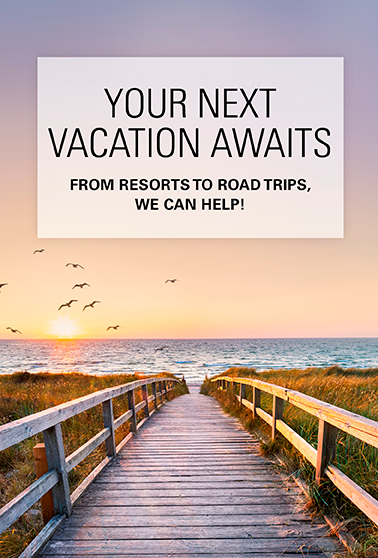Preparation is key to truly enjoying your next adventure. Here are some invaluable tips that our AAA Travel experts have compiled over the years, that should help ensure you have a smooth experience.
Before You Leave Home
- Travel to Canada requires ID: a passport (or birth certificate for younger travelers) is required for travel to Canada. You can have passport photos taken at your local AAA service center
- Understand carry-on baggage limits: passengers are limited to one carry-on bag and one personal item such as a purse or briefcase (size/weight restrictions and extra fees vary by airline)
- Determine checked baggage limits: check with your airline for specific size and weight limit policies; overweight baggage may be subject to additional charge
- Contact your airline (phone, online): confirm your reservation and flight times – nearly all airlines allow you to check-in online up to 24 hours in advance of your flight
- Arrange for a ride: have a friend drive you or take public transportation or a shuttle service to the airport to save the time and reduce the stress and expense of long-term parking
- Dress comfortably: avoid clothes and shoes that contain metal, as they may result in extra screening. Slip-on shoes are quicker to remove and put on.
- Pack snacks: many airlines no longer offer food in-flight, so be prepared; this is much less expensive than buying snacks at the airport, however beverages in containers more than 3 ounces are prohibited unless purchased at the airport after the security checkpoint
- Carry valuables with you: take jewelry, cameras, medications, and important documents with you in your carry-on bag, not in checked luggage
- Prepare for possible delays: bring a book, newspaper, cards or other diversions to help pass the time
- Secure your house: make your house appear lived-in, lock all windows and doors, close shades, stop newspaper delivery, have the post office hold your mail, set a light to operate on a timer and don’t mention your trip on your telephone answering machine
Packing Tips
- Avoid over-packing your bag: security screeners need to be able to easily close your luggage after inspection
- Footwear: Shoes are heavy and should be packed at the bottom of your luggage and at the wheelbase. This will help keep your luggage standing up.
- Gifts: ship gifts or leave them unwrapped; otherwise, security may tear off the wrapping paper
- Delicate items: consider placing personal belongings or delicate items in clear plastic bags to reduce handling by security
- Baggage ID: use baggage tags with cover flaps to help keep your information private; tape a business card to the inside of your bags in case external identification is lost; if you book your travel through AAA Washington, for additional privacy you may use the address of one of our service centers instead of your own address on your baggage tag
- Mark your baggage: many bags look alike, so use colored ribbon or tape on your bag for easier identification in baggage claim
- Do not lock baggage: when screening your bags, security personnel may break your locks if necessary; use a TSA approved lock they can access
- Items to avoid: do not carry on or check knives, firearms, flammable items; only 3.4 ounce containers of liquid, gels or aerosols are allowed; check with the US Department of Homeland Security, Transportation Security Administration for more details
At the Airport
- Arrive early: arrive two or more hours before your flight (three hours before an international flight) to allow extra time for crowds and security procedures
- Check as much baggage as possible: overhead compartments and carry-on space will be limited
- Keep photo identification handy: you will be asked for it numerous times during the check-in and security process
- Carry your tickets: keep your airline tickets and/or a copy of your itinerary from your travel agent readily accessible
- Have your boarding pass ready: have an actual boarding pass in-hand before going through airport security; an airline ticket (whether paper, printed electronic or internet confirmation) is not acceptable for passage through security
- International travel: carry your passport, as well as a copy of it and extra photos, separately, in case they’re lost
- Never leave your bags unattended
- Avoid strangers: do not accept packages or watch bags for strangers
- Expect questions: be prepared to politely answer questions from airline and security personnel
- Do not joke: security personnel are trained to react when they hear talk concerning bombs, firearms or terrorists and penalties can be severe
- Be polite: politeness and a sense of humor go a long way to receiving good service in any situation









